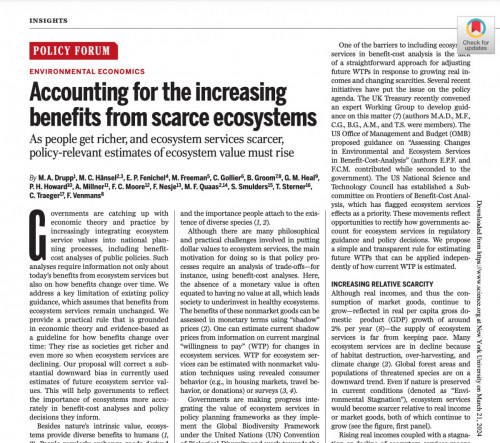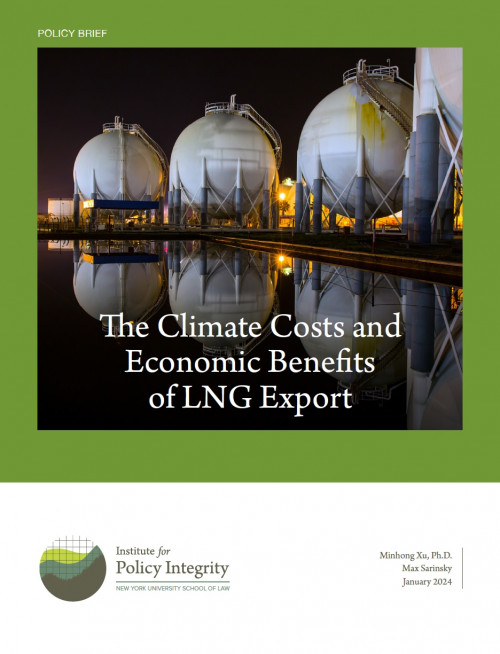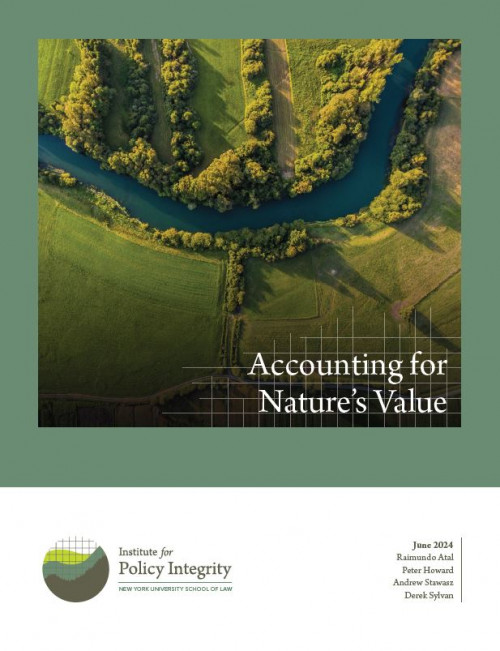-
Comments to USGCRP on the Annotated Outline for the First National Nature Assessment
The U.S. Global Change Research Program, which coordinates federal research and investments in understanding and responding to the forces shaping the global environment, engaged in a public consultation process on the outline for the U.S.’s first National Nature Assessment. Policy Integrity suggested changes to the outline in general and provided specific comments on some individual chapters, as requested.
-
Amicus Brief in Supreme Court Case on the Consideration of Downstream Costs in NEPA Analyses
The National Environmental Policy Act requires agencies to take a hard look at the environmental impacts of their decisions, prior to acting. In this case, the Surface Transportation Board, after conducting an environmental review, permitted a proposed railway that would transport oil in Utah’s Uinta Basin. The D.C. Circuit found that the Board’s environmental analysis failed to properly consider the indirect effects of the railway, including increased drilling and pollution impacts in the Gulf Coast, due to an influx of crude oil and increased refinery operations. The Supreme Court granted certiorari in June 2024 on the question “whether the National Environmental Policy Act requires an agency to study environmental impacts beyond the proximate effects of the action over which the agency has regulatory authority.” We argue the Court should affirm the D.C. Circuit’s ruling and interpret NEPA–in line with longstanding precedent–to require agencies to consider reasonably foreseeable effects.
-
Amicus Brief in Support of DOI and BOEM’s 2024-2029 Five-Year Leasing Plan for OCS Resources
Policy Integrity submitted an amicus brief in support of the Department of the Interior and BOEM's 2024-2029 five-year leasing plan for Outer Continental Shelf (OCS) resources, raising three main points. First, we review how the Outer Continental Shelf Lands Act's (OCSLA) legislative history supports Interior's consideration of downstream effects when valuing OCS oil and gas resources. Second, Policy Integrity explained how Interior's decades-long regulatory practice in creating five-year leasing plans included consideration of downstream environmental effects in various ways, like assessing the relative environmental impacts of using different energy sources. Third, Policy Integrity explained why standard valuation practices support Interior's consideration of downstream public costs from OCS resource consumption alongside downstream private benefits from that same consumption.
-
The Narrow Reinterpretation: The Oil and Gas Industry’s Retreat from the Broad Permitting Authority It Long Embraced
Published in the Harvard Environmental Law Review Online
What's the function of oil and gas permitting agencies? Despite broad statutory grants to federal agencies, oil and gas companies increasingly argue that the role of those agencies is to promote development regardless of whether it is socially desirable. But this “Narrow Reinterpretation,” in addition to lacking textual support, is at odds with longstanding practice. What changed? Not the governing statutes, at least not in pertinent part. But the energy sector has: renewable sources have replaced coal as the primary competitors to oil and gas.
-
Accounting for Nature’s Value
National accounts—which measure a country’s aggregate economic activity, including Gross Domestic Product (GDP)—largely ignore natural capital and ecosystem services. This omission occurs because national accounts heavily rely on market transactions to identify and value economic activity, whereas ecosystems’ contributions occur most commonly outside markets. This leads governments, businesses, and decisionmakers to ignore or misidentify some sources and uses of their income and wealth, skewing their decisionmaking. Recognizing these shortcomings, many countries, including the United States, are increasingly moving towards Natural Capital Accounting (NCA), a system of measuring natural capital and ecosystem services in a way that allows for their integration with national accounts. In this report, we provide an overview of NCA for non-economists.
-
Comments to the Army Corps of Engineers on Agency Specific Procedures to Implement the Principles, Requirements, and Guidelines for Water Resources Investments
In February 2024, the Army Corps of Engineers proposed a series of procedures to implement the governmentwide Principles, Requirements, and Guidelines for water-resource projects. The “heart” of these agency-specific procedures (ASPs) is ensuring that decisionmakers consider a wide suite of economic, environmental, and social benefits and costs as they invest in such projects. The proposal reasonably moves the Corps away from its historical and inefficiently narrow focus on national economic development to the exclusion of other essential objectives like environmental quality and distributional considerations. While the proposal takes valuable steps toward more comprehensive accounting of societal benefits and improved decisionmaking, our comments recommended several reasonable steps the Corps can take to make these ASPs even more effective.
-
Letter to DOE on Programmatic Review of LNG Export Program
In January, the White House announced a pause on LNG export approvals for the Department of Energy to update its underlying analyses for authorizations, which underpin its public interest determinations. In particular, the announcement notes that DOE’s economic and environmental analyses are outdated and calls for them to be updated. This letter offers recommendations for updating DOE’s analyses.
-

Accounting for the Increasing Benefits From Scarce Ecosystems
As people get richer, and ecosystem services scarcer, policy-relevant estimates of ecosystem value must rise
Governments are catching up with economic theory and practice by increasingly integrating ecosystem service values into national planning processes, including benefit-cost analyses of public policies. Such analyses require information not only about today’s benefits from ecosystem services but also on how benefits change over time. We address a key limitation of existing policy guidance, which assumes that benefits from ecosystem services remain unchanged. We provide a practical rule that is grounded in economic theory and evidence-based as a guideline for how benefits change over time: They rise as societies get richer and even more so when ecosystem services are declining. Our proposal will correct a substantial downward bias in currently used estimates of future ecosystem service values.
-

The Climate Costs and Economic Benefits of LNG Export
Gas provides nearly a quarter of the world’s total energy supply. As part of that supply chain, gas is shipped between continents in the form of liquefied natural gas (LNG). The United States is now the world’s largest LNG exporter following a surge in gas exports since 2016, but these exports have generated controversy due to their climate effects.This policy brief provides an analysis to support an effort to balance the full range of impacts from LNG exports. Using DOE’s own published studies, we compare the climate cost per unit of LNG export to the economic benefit (measured using consumer welfare). We find that climate costs likely exceed economic benefits. While the precise difference depends on several factors, gross climate damages greatly exceed economic benefits under all scenarios evaluated. These findings provide useful insights as DOE prepares to re-evaluate the LNG export program.
-
Amicus Brief in D.C. Circuit Opposing FERC Pipeline Approval
The Federal Energy Regulatory Commission (FERC) recently approved the construction of a new natural gas pipeline that would run through New Jersey and Pennsylvania. The gas capacity this expensive pipeline would provide, most of which will serve New Jersey markets, is unnecessary to meet the demand of New Jersey customers: the New Jersey Board of Public Utilities commissioned a study that demonstrates as much. We submitted an amicus brief in support of petitioners challenging this pipeline. In our brief, we explain that, in approving pipeline applications, FERC has abdicated its statutory responsibility to examine whether a pipeline is truly needed. Instead of determining whether a pipeline would serve the public interest, FERC defers to the assertions of profit-motivated pipeline developers and their customers. FERC's practice of approving needless pipelines is particularly concerning in light of how it regulates the development of electric transmission infrastructure, a related regulatory process. We argue that FERC should have placed greater weight on the rigorous economic study conducted by an expert state agency charged with ensuring safe and adequate gas supply for its residents.
Viewing recent projects in Natural Resources










